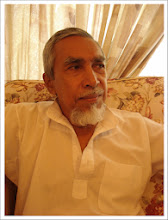1. My father’s alma mater was the Penang Free School. I
suppose he was proud to be an old Free School boy. An article in the Straits Times dated 30 September 1915,
page 9, reported that he presided over a meeting of all the old Free School
boys in Alor Star. It was held at the Government English School on September
26, 1915 to discuss the steps to be taken to celebrate the centenary of the old
school on a grand scale the following year. A committee was elected to make
arrangements; the elected members were Messrs. M. Sheriff, M. I. Merican, A.
Manaff, Goh Soon Leong, S. M. Idid, and S. Mohamed.
2. According to a
newspaper report in the
Straits Echo and Times of Malaya
dated 26 November 1956, my father was
one of Mr. Hargreaves’ brilliant pupils in the Queen’s Scholarship class, but
he had to give up his study for the Queen’s Scholarship examination. According
to the report, his uncle, who was also his guardian, “would not
allow him to proceed to England even if he should win such a scholarship.”
3. My father joined the tutorial staff of his alma
mater upon leaving school. He was a popular teacher and took a great interest in
the School. Being fond of writing, he would lend a hand with the school
magazine. This is evident from an acknowledgement note in one of the issue: “Mr. M. I. Merican has very kindly taken considerable interest in
this issue of the Magazine.” Occasionally
he would contribute articles to the papers, writing under his initials M.I.M.
4. He was a member of the Cadet Corps with the
rank of Colour Sergeant. In a report of its activities published in the Free
School Magazine, he wrote:
“…Second-Lieutenant Mann, our very energetic Second-Lieutenant, has gone on long leave. His absence accounts for the dulness [sic] now prevailing in the P. V. C. C. circles. Our commandant (1st Lieutenant Hamilton) is too […] to attend to the Cadets for obvious reasons. It follows that we are suffering from a dearth of officers and it is high time that someone was appointed to act for Lieutenant Mann. It is a pity to let things go thus for it disheartens a good many Cadets and discourages those who wish to join the Corps. Night marches which have been something of a stimulus to the Corps’ are conspicuous by their absence. There should be a night march once a month. In our circles there is a whisper that many of us would welcome Mr. Cheeseman if the authorities could see their way to make him an officer. We feel sure he would be the right man in the right place.“It is hard to get recruits now and something must be done to encourage boys to enlist. To remedy dulness [sic] and lack of interest in the Cadets we must have an officer who will put some keeness [sic] and energy into the Corps and unless this be done, things will go from bad to worse.”
5. It was during his time as a teacher that his
name appeared in the List
of Qualified Jurors, Penang, 1904. He continued service
on the staff until Mr. R. H. Pinhorn replaced Mr. Hargreaves as Headmaster in
1904. About six years later, he resigned his post in the Penang Free School and
came over to Kedah and assumed the headmastership of the Government English School
in February 1911.










